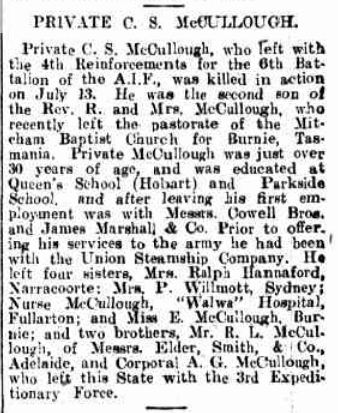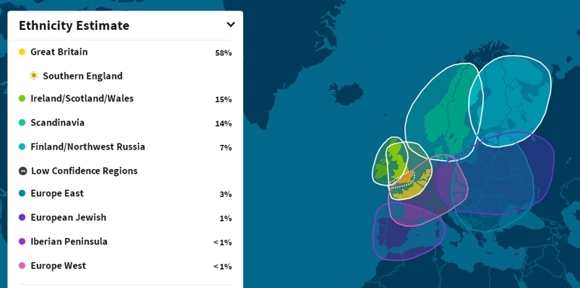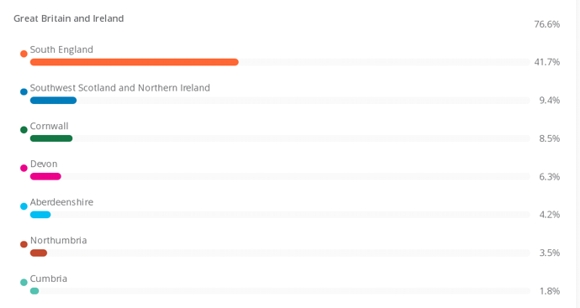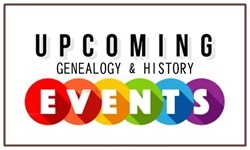Just a Little Bit Irish
The 17th of March is St Patrick’s Day. A day for all things Irish. A day to remember your Irish heritage, and that’s what I’m doing today.
On checking my DNA results from Ancestry, it says that I’m 15% Irish/Scottish/Welsh. My guess is that it’s mostly Irish – but as always, that is still to be proven.
And my Living DNA results they say 9.4% South West Scotland and Northern Ireland ….
So while the stats vary (all DNA tests do as they use different algorithms), they do show that I do have some Irish (and/or) Scottish blood in me.
But I’ll be honest, the Irish lines of my family aren’t ones that I’ve done much research on yet … (one day!!). However I do know that McCullough family comes from Randalstown, in Country Antrim, so that’s a start.
Beyond that, I do believe that my 4x great grandma Anne/Hannah McGrath who married William Cosgrove in South Australia in 1856 came from Ireland but that’s yet to be proven.
And I wouldn’t be surprised to find another line or two that end up being Irish. But time (and research of course) will tell.
So on St Patrick’s Day, be sure to take a moment to remember those from the homeland. Those who left their country for various reasons (some willing, others not), and then made a new life in their adopted country. Each of them playing a part in making you the person you are today.
One Obituary, So Many Clues
Obituaries (aka obits) are fabulous if you can find them. While browsing around on Trove (aka Troving) recently I came across this obit for Private Charles Spurgeon McCullough. This gent is one of my great grandma’s (Dorothy McCullough) brothers – so that makes him my great grand uncle.
It’s not a long one in comparison to some – but you really have the be in awe of the detail that this obit includes.
While this is a great read for anyone (family or not), for this post I have decided to extract each detail one-by-one to highlight just how valuable an obituary really can be. And while newspapers may not be 100% accurate, they can be used as a guide.

Australians in Action, Roll of Honour
PRIVATE C. S. McCULLOUGH, 14 August 1915 Chronicle, p. 42.
http://nla.gov.au/nla.news-article89149212
So let’s start …
- we know his name – the article names him as C.S. McCullough – no it doesn’t give his actual name, but it doesn’t just list him as Private McCullough or Mr C. McCullough either. It has both initials, so that’s a bonus.
- and says that he was in the Australian army and in which battalion – the article lists him as a Private in the army “who left with the 4th Reinforcements for the 6th Battalion of the A.I.F.”
- we learn his position in the army – “Private C.S. McCullough”
- this was in World War 1 – the newspaper date was in 1915
- the date of his death – the article lists his date of death as 13 July
- no year of death given but it is inferred that it is the same year as the newspaper (1915)
- he has an older brother as he is listed as “the second son”
- his parents are listed as Rev. R. and Mrs McCullough
- his father’s title is Reverend – so his father is a minister
- it also mentions where his father was a minister – Mitcham, [South Australia] and Burnie, Tasmania – “recently left the pastorate of the Mitcham Baptist Church for Burnie, Tasmania.”
- and that his family has recently moved to Tasmania
- it mentions which religion – Baptist
- his age is mentioned – “just over 30 years of age”, based on that we can assume he would have been born around 1885
- his education is mentioned – “was educated at Queen’s School (Hobart) and Parkside School” [South Australia]
- this also give clues as to where the family was living – Adelaide and Hobart
- his employment is also mentioned – “employment was with Messrs. Cowell Bros. and James Marshall & Co. Prior to offering his services to the army he had been with the Union Steamship Company.”
- he had four sisters, two were married, two not
- the sisters are all listed with their place of residence at the time (1915) – “He left four sisters, Mrs. Ralph Hannaford, Narracoorte; Mrs. P. Willmott, Sydney; Nurse McCullough, “Walwa” Hospital, Fullarton; and Miss E. McCullough, Burnie
- one of his sisters was a nurse
- and she worked at the “Walwa” Hospital, at Fullarton, South Australia
- C.S. McCullough also had two brothers – “Mr. R. L. McCullough, of Messrs. Elder, Smith & Co., Adelaide, and Corporal A.G. McCullough,
who left this State with the 3rd Expeditionary Force.”
- one of who worked for Elder, Smith & Co. in Adelaide
- and the other was also in the A.I.F., and fought with the 3rd Expeditionary Force.
- his brother, A.G. McCullough was living in South Australia prior to serving in the A.I.F.
So you see just how much information can be gleaned from just one obituary. And based on this info, there’s a lot here that can be followed up on – military records, ministry records, school records, and employment records for numerous family members. Possibly even land records and local history for the area the family lived and/or worked.
Here’s hoping for more family obits!!
Obituaries Really ARE Genealogy Gold!
I recently read Kenneth Marks’ 30 Reasons Why Searching for Obituaries is Like Finding Gold post, and I have to agree. If you are lucky enough to find an obit for your reli, they usually contain a whole host of information.
Just check out this one that is on my great great grandpa Robert McCullough. When I saw “accident” written on his death certificate you could feel that there was a story to it. So off to Trove I went, and I found his obituary in The Advertiser, on 13 October 1931.
This 19 line obituary, though short in comparison to many, still contains a wealth of information:
Finding Hidden Gems!
The fact that my family has always been hoarders (well, my mum’s side of the family anyway), is a good thing, as it means there are so many documents, artifacts, photographs and other memorabilia that has been preserved, so I’ve started documenting these over on my other blog at Memorabilia House. But this post isn’t here to tell you all about that … well not exactly. It’s about the “hidden gems” that I have been finding as I’ve been documenting the items. And in this case I’m referring to what been finding in old bibles.
Our family has a LOT of old bibles around the place. But since my reli’s were a religious bunch, as some were ministers, and others founded churches, and donated land for churches I guess it’s not really surprising.






